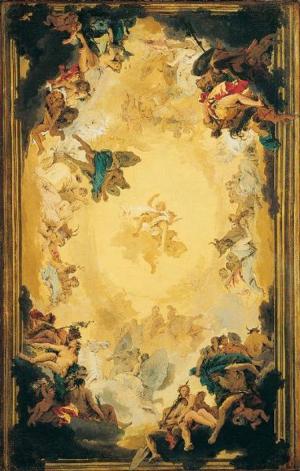The Downfall [La Débâcle]
Nonfiction, Religion & Spirituality, New Age, History, Fiction & Literature| Author: | Emile Zola | ISBN: | 9781465619082 |
| Publisher: | Library of Alexandria | Publication: | March 8, 2015 |
| Imprint: | Language: | English |
| Author: | Emile Zola |
| ISBN: | 9781465619082 |
| Publisher: | Library of Alexandria |
| Publication: | March 8, 2015 |
| Imprint: | |
| Language: | English |
The camp was pitched in the centre of a fertile plain at a mile or so from Mulhausen, in the direction of the Rhine. In the twilight of a sultry day in August, under the dull sky, across which heavy clouds were drifting, the rows of shelter-tents could be seen stretching out amid a broad expanse of ploughed land. At regular intervals along the front gleamed the piles of arms, guarded by sentinels with loaded rifles, who stood there stock-still, their eyes fixed dreamily on the violet-tinted mist which was rising from the great river on the far horizon. The men had arrived from Belfort at about five o' clock. It was now eight, and they had only just received their rations. The firewood, however, had apparently gone astray, for none had been distributed, so that there was neither fire nor soupe. The men had been obliged to munch their hard, dry biscuit, washing it down with copious draughts of brandy, which had dealt the last blow, as it were, to their failing legs, already nerveless through fatigue. Near the canteen, however, beyond the stacks of arms, two men were stubbornly endeavouring to light some green wood—a pile of young tree trunks, which they had cut down with their sword-bayonets, and which obstinately refused to blaze. Merely a coil of thick black smoke of lugubrious aspect ascended from the heap into the evening air. There were here only 12,000 men, all that General Félix Douay had with him of the Seventh Army Corps. The first division, summoned by MacMahon the day before, had started for Frœschweiler; the third was still at Lyons; and the general had resolved to leave Belfort and advance to the front with merely the second division, supported by the reserve artillery and an incomplete division of horse. Camp fires had been signalled at Lorrach, and the Sub-Prefect of Schelestadt had telegraphed that the Prussians were about to cross the Rhine at Margolsheim. The general, who realised how dangerous was his isolated position at the extreme right of the other army corps, with none of which he was in communication, had hastened his advance to the frontier the more rapidly, as news had reached him, the day before, of the disastrous surprise of Weissenburg. Even supposing he did not have to resist an attack on his own lines, it was now to be feared that he might at any moment be called upon to support the First Army Corps. That very day—that disquieting, stormy Saturday, August 6—there must have been fighting somewhere, most probably near Frœschweiler. There were signs of it in the air, in the heavy, restless sky across which there now and again swept a chilly shudder—a sudden gust of wind which passed by moaning, as if with anguish. For the past two days the troops had been convinced that they were advancing to battle. They one and all expected to find the Prussians in front of them at the end of their forced march from Belfort to Mulhausen.
The camp was pitched in the centre of a fertile plain at a mile or so from Mulhausen, in the direction of the Rhine. In the twilight of a sultry day in August, under the dull sky, across which heavy clouds were drifting, the rows of shelter-tents could be seen stretching out amid a broad expanse of ploughed land. At regular intervals along the front gleamed the piles of arms, guarded by sentinels with loaded rifles, who stood there stock-still, their eyes fixed dreamily on the violet-tinted mist which was rising from the great river on the far horizon. The men had arrived from Belfort at about five o' clock. It was now eight, and they had only just received their rations. The firewood, however, had apparently gone astray, for none had been distributed, so that there was neither fire nor soupe. The men had been obliged to munch their hard, dry biscuit, washing it down with copious draughts of brandy, which had dealt the last blow, as it were, to their failing legs, already nerveless through fatigue. Near the canteen, however, beyond the stacks of arms, two men were stubbornly endeavouring to light some green wood—a pile of young tree trunks, which they had cut down with their sword-bayonets, and which obstinately refused to blaze. Merely a coil of thick black smoke of lugubrious aspect ascended from the heap into the evening air. There were here only 12,000 men, all that General Félix Douay had with him of the Seventh Army Corps. The first division, summoned by MacMahon the day before, had started for Frœschweiler; the third was still at Lyons; and the general had resolved to leave Belfort and advance to the front with merely the second division, supported by the reserve artillery and an incomplete division of horse. Camp fires had been signalled at Lorrach, and the Sub-Prefect of Schelestadt had telegraphed that the Prussians were about to cross the Rhine at Margolsheim. The general, who realised how dangerous was his isolated position at the extreme right of the other army corps, with none of which he was in communication, had hastened his advance to the frontier the more rapidly, as news had reached him, the day before, of the disastrous surprise of Weissenburg. Even supposing he did not have to resist an attack on his own lines, it was now to be feared that he might at any moment be called upon to support the First Army Corps. That very day—that disquieting, stormy Saturday, August 6—there must have been fighting somewhere, most probably near Frœschweiler. There were signs of it in the air, in the heavy, restless sky across which there now and again swept a chilly shudder—a sudden gust of wind which passed by moaning, as if with anguish. For the past two days the troops had been convinced that they were advancing to battle. They one and all expected to find the Prussians in front of them at the end of their forced march from Belfort to Mulhausen.
![Cover of the book The Downfall [La Débâcle] by Emile Zola, Library of Alexandria](https://www.kuoky.com/images/2015/march/500x500/9781465619082-sWaL_500x.jpg)














